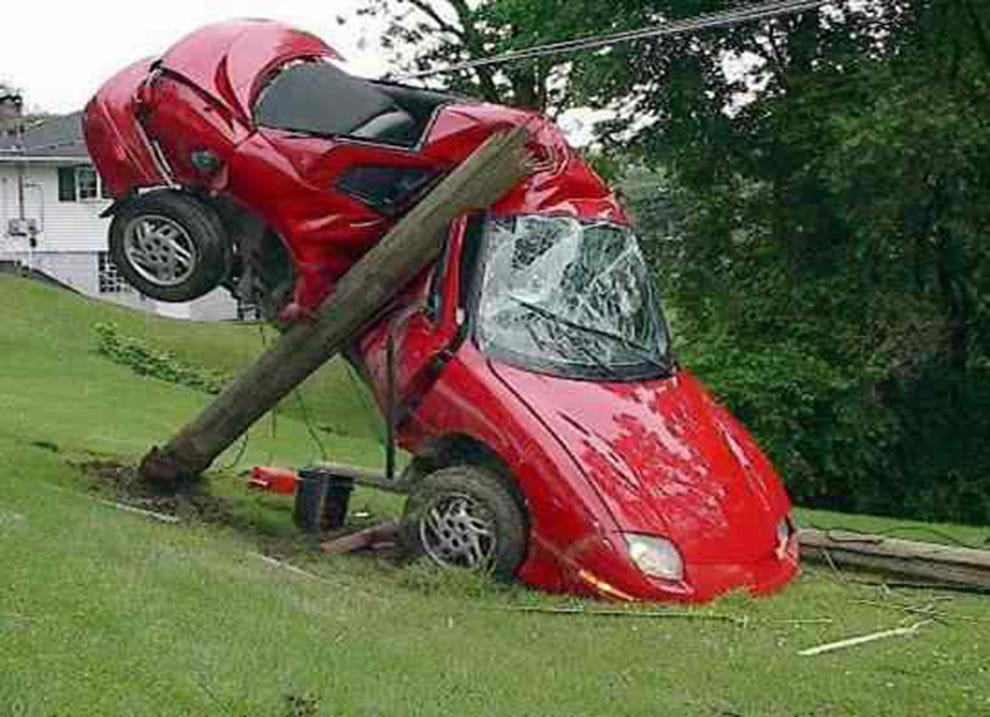Looking away from a car crash
Free will, agency, and monetization of your twitter account
When you think about the idea of free will today, it is most often contextualised as the choice between two options. A cross in the road - but both paths lead "forward". I think this framing is the cause of so much semantic confusion and philosophical uncertainty on the topic. I think the question of free will is only this way in thought experiments, and never that way in any other context - that is, "real life", for lack of a better term. In real life free will is not being able to say A or B, but saying Yes or, crucially, No.
Thesis statement: free will is not the ability to plan ahead and make the logical-rational optimising choice between two options. That is better termed "planning" and "long time preference". Free will is rather, simply, the ability to say No. The ability to recognise a bad deal and opting out. "if everyone else was jumping off a bridge, would you do it too?"
A joke on the Internet is that only autistic people have true agency, the implication being that they are impervious to social pressures and can make cold rational judgements. They won't jump off the bridge. But they also won't do a lot of positive things and pointless socialisation, because they can't compute the rational benefit of it.
An alcoholic can recognize with every fiber of his being that his life and behaviour is a bad deal, but no matter how high IQ he is and how well he can argue and document and explain what the rationally optimal thing to do is - quit - he can still keep drinking all his life, and just spend all of it thinking about how bad and stupid it all is.
Free will is the ability to opt out of a raw deal. The existentialists said the same thing in so many words: the first question of philosophy is, should I kill myself? That is: is life a raw deal? If so, and if reason is the ultimate virtue, then there is only one calculation, one outcome. And yet - even the pessimistss don't kill themselves. They write philosophy.
A fundamentally new phenomenon the modern human must contend with, is the screens and what's on them. What is on them is, the proverbial car crash. That's why the Internet is addicting - it is all pornographic, violent, and transgressive. Every time you open op a smartphone app, you are fundamentally the exact same as a 14 year old watching snuff videos. The market is just saturated enough that it can cater to any degree of depravity, or lack thereof. If gore is too much for you, you can watch Ben Shapiro own libs. Or you can watch other people own Ben Shapiro.
The evolutionary bottleneck we are living through, that is dividing the world into a large group of brain damaged serfs, and a tiny group of something else, is selecting for the ability to look away from a car crash. Opting out of a bad deal. "If philosophy wasn't real, it would be necessary to invent it".
The media-technical environment we live in today is radically different from any other time in human history, and billions of dollars and untold hours of manpower has been spent optimising ways to exploit evolutionary behaviors. If you own a smart phone, you will be living in a casino every day for the rest of your life. And famously the house always wins. The only way to survive a casino is to set a number, before you start, of x value you are willing to SPEND, regardless of the amount you win. You can beat this system the same way. That's the bottleneck. That's the game.
The reason you can't look away from a car crash is because in nature, it is important to you. You may have to intervene, and the tragedy will impact you, at least socially. You are a social animal, and the mere act of watching death violence and carnage, impacts you - there is no "only viewing". The voyeur is a participant. And today, you are watching car crashes every hour of the day, because a system has been put in place, that you volunteered to be a part of, that monetizes your attention - your viewing - your voyeurism. Every time you watch a car crash, someone makes a dollar, and you lose a part of your soul. You are damaged forever.
Decide how much you are willing to lose.




This should be the first thing you see when you get a piece of technology that connects to the internet. So much time man...
Ultimately, it's being able to say yes or no to free will itself; can you say yes to having free will, or not? Or really, to God